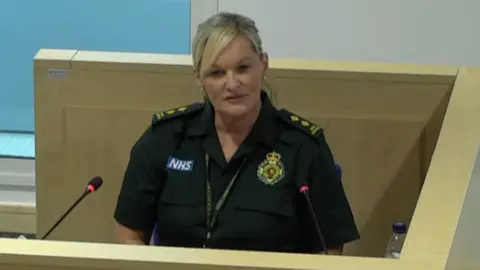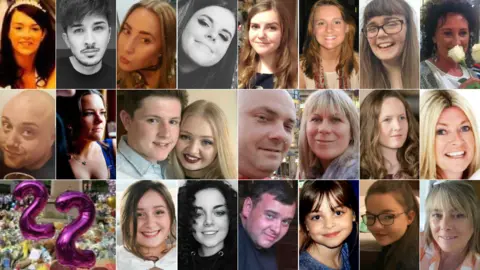Manchester Arena Inquiry: Bomb injured 'waited for hours to go to hospital'
 Manchester Arena Inquiry
Manchester Arena InquiryCritically ill casualties were "waiting for hours" to be taken to hospital in the aftermath of the Manchester Arena attack, an inquiry has heard.
Senior paramedic Joanne Hedges was one of the triage officers overseeing patients who were being treated on the concourse of Victoria station nearby.
She arrived at the arena 40 minutes after the blast which killed 22 people.
Ms Hedges told the inquiry she had been informed the foyer, where the bomb exploded, was a restricted "hot zone".
"We were told not to go upstairs [to the Arena foyer] and wait for patients to be brought down," she said.
Ms Hedges said she had been informed the bomb scene would not be safe for most paramedics to work in.
In addition to the 22 people who were killed, hundreds more were injured when suicide bomber Salman Abedi detonated his device at the end of an Ariana Grande concert on 22 May 2017.
Ms Hedges was asked why she thought some 'priority-one' casualties were waiting so long to be taken to hospital.
"I presume at that point it's waiting for the hospitals to be cleared," she told the inquiry.
"It'll be the only reason why any patient would have to wait... it would take a period of time for hospitals to get extra staff in, to cancel the non-urgent patients."
 Family handouts
Family handoutsShortly after she arrived at the foyer, Ms Hedges was told by fellow paramedic Paddy Ennis that there were 30 or more critically injured patients.
When questioned how she felt at that moment, she replied: "Terrified, absolutely terrified."
The inquiry was told 26 people were brought down from the foyer on makeshift stretchers while some had no tourniquets to stem their bleeding wounds.
Ms Hedges said police officers were putting pressure on wounds before ambulance crews started treating them.
'Heated discussions'
When asked if there were sufficient paramedics and crews, she responded: "Yes - the patients had the clinical interventions they immediately needed from the paramedic crews. They had ongoing treatment to a high standard."
Ms Hedges said there were a few "heated discussions" with police officers about moving patients.
She added that some police officers didn't seem to understand a major incident plan.
When asked if anything could have been done better on the night, she said there was a "lack of communication" between the fire service and the ambulance service.
Ms Hedges said when she arrived she presumed the fire service was already in the foyer because she had not seen them anywhere else. .
The inquiry continues.

Why not follow BBC North West on Facebook, Twitter and Instagram? You can also send story ideas to northwest.newsonline@bbc.co.uk